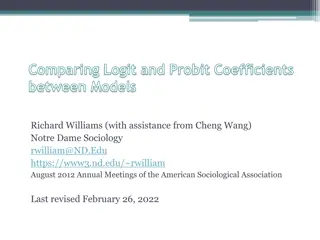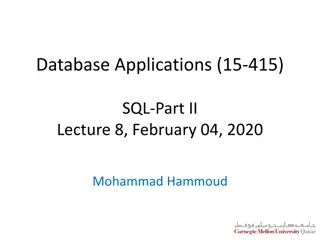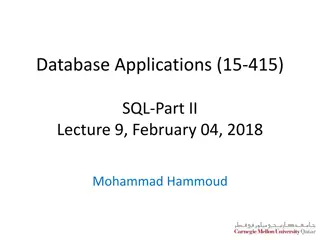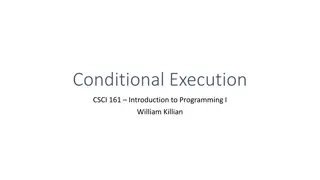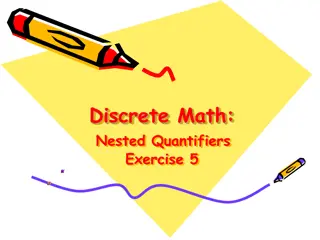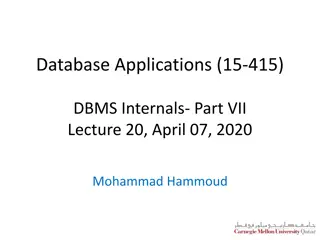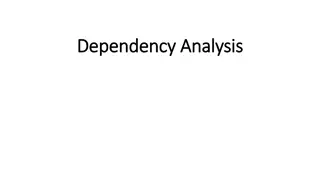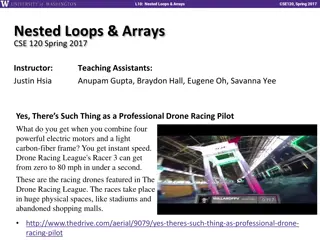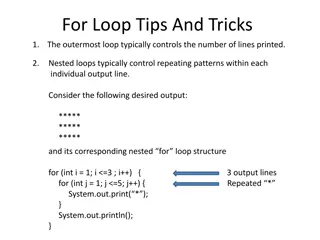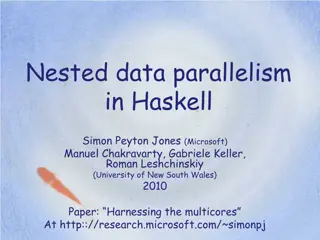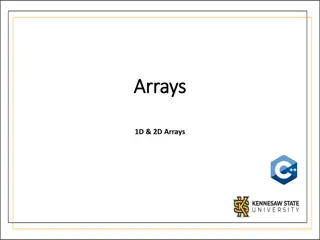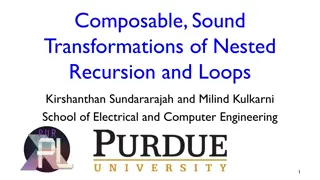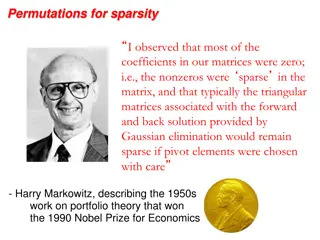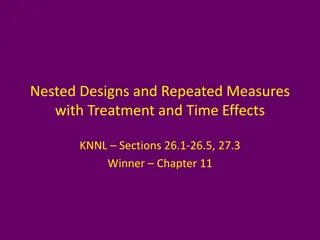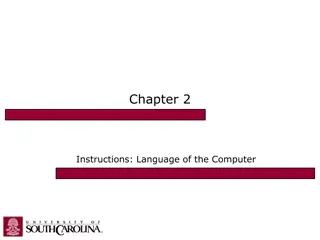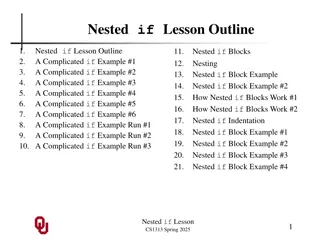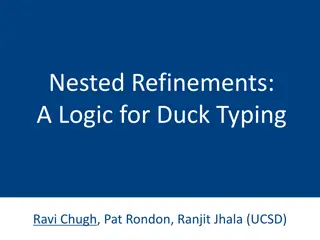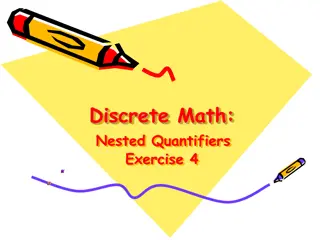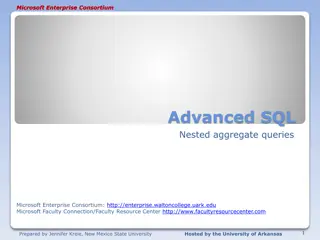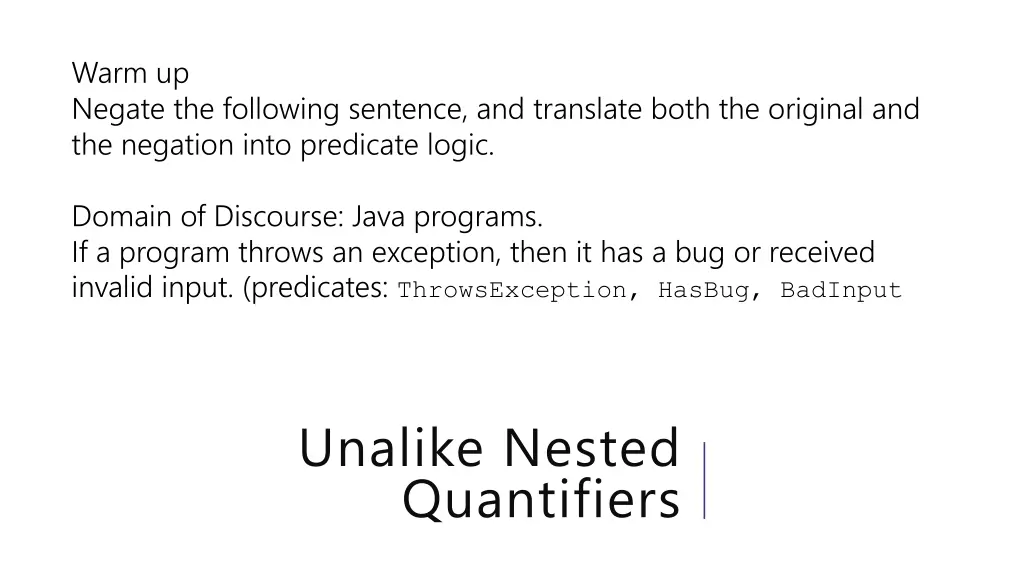
Predicate Logic Negation Exercises
Explore how to negate sentences in English and translate them into predicate logic. Practice forming negations for statements involving Java programs. Develop a deeper understanding of predicate logic concepts through practical examples.
Download Presentation

Please find below an Image/Link to download the presentation.
The content on the website is provided AS IS for your information and personal use only. It may not be sold, licensed, or shared on other websites without obtaining consent from the author. If you encounter any issues during the download, it is possible that the publisher has removed the file from their server.
You are allowed to download the files provided on this website for personal or commercial use, subject to the condition that they are used lawfully. All files are the property of their respective owners.
The content on the website is provided AS IS for your information and personal use only. It may not be sold, licensed, or shared on other websites without obtaining consent from the author.
E N D
Presentation Transcript
Warm up Negate the following sentence, and translate both the original and the negation into predicate logic. Domain of Discourse: Java programs. If a program throws an exception, then it has a bug or received invalid input. (predicates: ThrowsException, HasBug, BadInput Unalike Nested Quantifiers
Announcements Remember to sign up for canvas groups for your lecture breakouts. If you don t have a group already, you can join a not-full-one at random. We ll try on Friday Proof checking tool: https://homes.cs.washington.edu/~kevinz/proof-test/ Will check your symbolic proofs, so you know if you ve applied rules properly. I do recommend it for rough drafts, I don t recommend for when you re stuck
About Grades Grades were critical in your lives up until now. If you were in high school, they re critical for getting into college. If you were at UW applying to CSE, they were key to that application Regardless of where you re going next, what you learn matters FAR more than what your grade in this course. If you re planning on industry interviews matter more than grades. If you re planning on grad school letters matter most, those are based on doing work outside of class building off what you learned in class. learn in this course
About Grades What that means: The TAs and I are going to prioritize your learning over debating whether -2 or -1 is more fair If you re worried about have I explained enough write more! It ll take you longer to write the Ed question than write the extended answer. We don t take off for too much work. And the extra writing is going to help you learn more anyway.
Regrades TAs make mistakes! When I was a TA, I made errors on 1 or 2% of my grading that needed to be corrected. If we made a mistake, file a regrade request on gradescope. But those are only for mistakes, not for whether -1 would be more fair If you are confused, please talk to us! My favorite office hours questions are can we talk about the best way to do something on the homework we just got back? If after after you do a regrade request on gradescope, you still think a grading was incorrect, send email to Robbie. Regrade requests will close 2 weeks after homework is returned.
Negation Negate these sentences in English and translate the original and negation to predicate logic. All cats have nine lives. ? ??? ? ???????? ?,9 ?(??? ? ???????? ?,9 ) There is a cat without 9 lives. All dogs love every person. ? ? ??? ? ?????(?) ???? ?,? ? ?(??? ? ????? ? ???? ?,? ) There is a dog who does not love someone. There is a dog and a person such that the dog doesn t love that person. There is a cat that loves someone. ? ?(??? ? ????? ? ????(?,?) ? ?([??? ? ????? ? ] ???? ?,? ) For every cat and every human, the cat does not love that human. Every cat does not love any human ( no cat loves any human )
Negation with Domain Restriction ? ?(??? ? ????? ? ????(?,?) ? ?([??? ? ????? ? ] ???? ?,? ) There are lots of equivalent expressions to the second. This one is by far the best because it reflects the domain restriction happening. How did we get there? There s a problem in this week s section handout showing similar algebra.
Nested Quantifiers Translate these sentences using only quantifiers and the predicate AreFriends(?,?) Everyone is friends with someone. Someone is friends with everyone.
Nested Quantifiers Translate these sentences using only quantifiers and the predicate AreFriends(?,?) Everyone is friends with someone. Someone is friends with everyone. ?( ? AreFriends(?,?)) ?( ? AreFriends(?,?)) ? ? AreFriends(?,?) ? ? AreFriends(?,?)
Nested Quantifiers ? ? ?(?,?) For every ? there exists a ? such that ? ?,?is true. ? might change depending on the ? (people have different friends!). ? ? ?(?,?) There is an ? such that for all ?,?(?,?)is true. There s a special, magical ? value so that ? ?,? is true regardless of ?.
Nested Quantifiers Let our domain of discourse be {?,?,?,?,?} And our proposition ?(?,?) be given by the table. What should we look for in the table? ? A A B B C C D D E E ?(?,?) A A T T T T T B B T F F T F ? ?? ?,? C C F T F F F ? D D F F F F T ? ??(?,?) E E F F F T F
Nested Quantifiers Let our domain of discourse be {?,?,?,?,?} And our proposition ?(?,?) be given by the table. What should we look for in the table? ? A A B B C C D D E E ?(?,?) A A T T T T T B B T F F T F ? ?? ?,? A row, where every entry is T C C F T F F F ? D D F F F F T ? ??(?,?) In every row there must be a T E E F F F T F
Keep everything in order Keep the quantifiers in the same order in English as they are in the logical notation. There is someone out there for everyone is a ? ? statement in everyday English. It would never never be phrased that way in mathematical English We ll only every write for every person, there is someone out there for them.
Try it yourselves Every cat loves some human. There is a cat that loves every human. Let your domain of discourse be mammals. Use the predicates Cat(?), Dog(?), and Loves(?,?) to mean ? loves ?.
Try it yourselves Every cat loves some human. There is a cat that loves every human. ? (Cat ? ?[Human(?) Loves(?,?)]) ? ?(Cat ? [Human(?) Loves(?,?)]) ? (Cat ? ?[Human ? Loves(?,?)]) ? ?(Cat ? [Human(?) Loves(?,?)])
Negation How do we negate nested quantifiers? The old rule still applies. To negate an expression with a quantifier 1. Switch the quantifier ( becomes , becomes ) 2. Negate the expression inside ( ? ? ? ? ?,? ? ?,? ) ?( ? ? ? ?,? ? ?,? ) ? ?( ? ? ?,? ? ?,? ) ? ? ?( ? ?,? ? ?,? ) ? ? ?[ ? ?,? ? ?,? ]
More Translation For each of the following, translate it, then say whether the statement is true. Let your domain of discourse be integers. For every integer, there is a greater integer. ? ?(Greater(?,?))(This statement is true: ? can be ? + 1 [? depends on ?]) There is an integer ?, such that for all integers ?, ?? is equal to 1. ? ?(Equal(??,1))(This statement is false: no single value of ? can play that role for every ?.) ? ?(Equal ? + ?,1 ) For every integer, ?, there is an integer ? such that ? + ? = 1 (This statement is true, ? can depend on ?
Inference Proofs and the Direct Proof Rule
Inference Rules ? ? ? ? Eliminate Direct Proof rule ?,? ? ? ? ?, ? ? ?;? Eliminate Modus Ponens ? ? ?;? Intro You can still use all the propositional logic equivalences too! ? ? ? Intro ? ?,? ?
How would you argue Let s say you have a piece of code. And you think if if the code gets null input then be thrown. How would you convince your friend? then a nullPointerExecption will You d probably trace the code, assuming you would get null input. The code was your given given The null input is an assumption The null input is an assumption
In general How do you convince someone that ? ? is true given some surrounding context/some surrounding givens? You suppose ? is true (you assume ?) And then you ll show ? must also be true. Just from ? and the Given information.
The Direct Proof Rule Write a proof given ? conclude ? ? ? Direct Proof rule ? ? ? ? This rule is different from the others ? ?is not a single fact. It s an observation that we ve done a proof. (i.e. that we showed fact ? starting from ?.) We will get a lot of mileage out of this rule starting today!
Given: ((? ?) (? ?)) Show: (? ?) Here s an incorrect proof. Given Eliminate (1) Eliminate (1) Given??? Modus Ponens 4,2 Modus Ponens 5,3 Direct Proof Rule 1. ? ? ? ? 2. ? ? 3. ? ? 4. ? 5. ? 6. ? 7. ? ?
Given: ((? ?) (? ?)) Show: (? ?) Here s an incorrect proof. Given Eliminate 1 Eliminate (1) Given ???? Modus Ponens 4,2 Modus Ponens 5,3 Direct Proof Rule Proofs are supposed to be lists of facts. Some of these facts aren t really facts 1. ? ? ? ? 2. ? ? 3. ? ? 4. ? These facts depend on ?. But ?isn t known generally. It was assumed for the purpose of proving ? ?. 5. ? 6. ? 7. ? ?
Given: ((? ?) (? ?)) Show: (? ?) Here s an incorrect proof. Given Eliminate 1 Eliminate (1) Given ???? Modus Ponens 4,2 Modus Ponens 5,3 Direct Proof Rule Proofs are supposed to be lists of facts. Some of these facts aren t really facts 1. ? ? ? ? 2. ? ? 3. ? ? 4. ? These facts depend on ?. But ?isn t known generally. It was assumed for the purpose of proving ? ?. 5. ? 6. ? 7. ? ?
Given: ((? ?) (? ?)) Show: (? ?) Here s a corrected version of the proof. Given Eliminate 1 Eliminate 1 Assumption Modus Ponens 4.1,2 Modus Ponens 4.2,3 1. ? ? ? ? When introducing an assumption to prove an implication: Indent, and change numbering. 2. ? ? 3. ? ? 4.1 ? 4.2 ? 4.3 ? When reached your conclusion, use the Direct Proof Rule to observe the implication is a fact. Direct Proof Rule 5. ? ? The conclusion is an unconditional fact (doesn t depend on ?) so it goes back up a level
Try it! Given: ? ?, ? ? ?, ?. Show: ? ?
Try it! Given: ? ?, ? ? ?, ?. Show: ? ? 1. ? ? 2. ? ? ? 3. ? 4.1 ? 4.2 ? ? 4.3 ? 4.4 ? ? 4.5 ? 5. ? ? Given Given Given Assumption Intro (3,4.1) Modus Ponens (2, 4.2) Commutativity (1) Eliminate (4.4, 4.3) Direct Proof Rule

